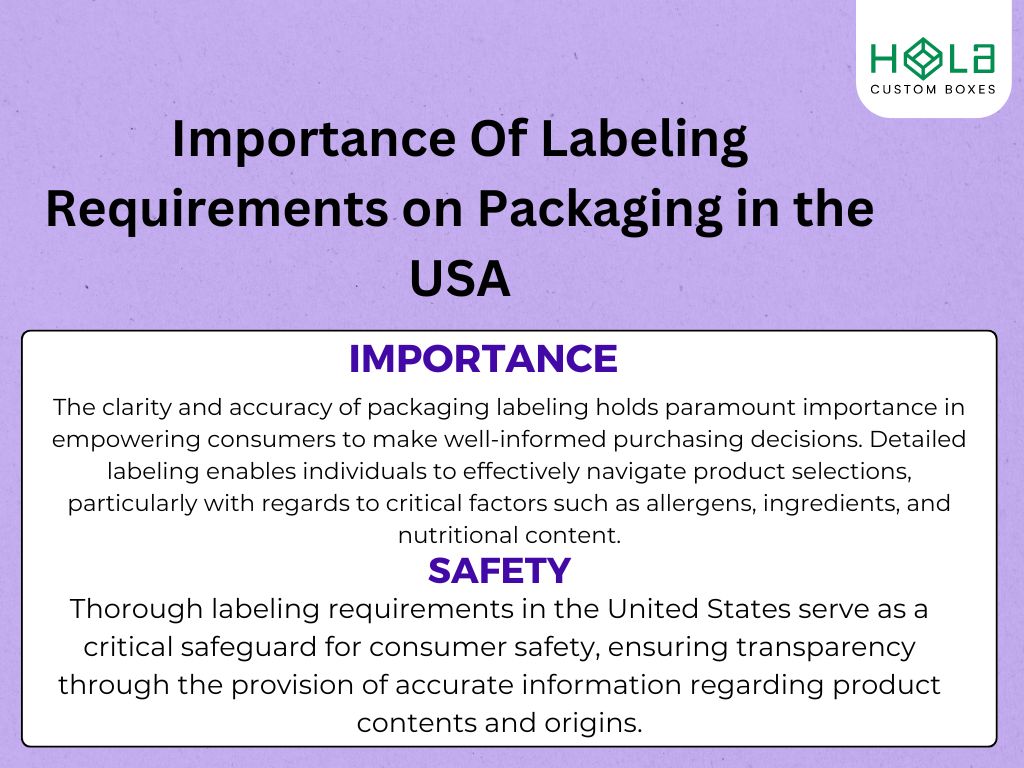Importance Of Labeling Requirements on Packaging in the USA
2024-07-25 16:06:51
Packaging labeling requirements in the United States exist to empower consumers, safeguard their safety, and promote transparency across the marketplace. Federal regulations mandate the disclosure of essential product information, including ingredients, allergens, and net contents. This enables buyers to make informed purchasing decisions aligned with their individual needs and preferences.
Compliance with these standards, such as the Fair Packaging and Labeling Act, also prevents deceptive practices and fosters trust between consumers and manufacturers. Continued exploration of these regulations reveals the pivotal role they play in maintaining product integrity and consumer confidence.
Main Points
Packaging labeling requirements in the USA empower consumers to make informed purchasing decisions by providing accurate information about products.
Detailed labeling disclosing ingredients, allergens, and nutritional content helps prevent consumer deception and ensures product transparency.
Federal regulations like the Fair Packaging and Labeling Act mandate comprehensive product information to safeguard consumer safety and promote fair competition.
Clear labeling enables consumers to align their purchases with their preferences, health needs, and ethical considerations.
Accurate and transparent labeling practices held manufacturers accountable for product integrity, enhancing brand reputation and consumer trust.
Importance of Clear Packaging Labeling

The clarity and accuracy of packaging labeling holds paramount importance in empowering consumers to make well-informed purchasing decisions. Detailed labeling enables individuals to effectively navigate product selections, particularly with regards to critical factors such as allergens, ingredients, and nutritional content.
Compliance with rigorous labeling requirements mandated by regulations like the Fair Packaging and Labeling Act guarantees transparency, trust, and consumer safety. Clear packaging labels prevent deception and facilitate fair competition among manufacturers, as they are prohibited from engaging in misleading marketing practices.
Ultimately, the provision of extensive product information through packaging labeling serves as a crucial tool in enabling consumers to make choices aligned with their individual needs and preferences.
Consumer Safety and Transparency
Thorough labeling requirements in the United States serve as a critical safeguard for consumer safety, ensuring transparency through the provision of accurate information regarding product contents and origins.
Detailed labels on packaging help consumers make informed purchasing decisions by clearly disclosing ingredients, potential allergens, and the source of products. These mandatory labeling regulations aim to prevent deceptive practices and false claims, fostering trust between consumers and manufacturers.
Compliance with labeling standards enhances consumer protection by enabling individuals to avoid products that may trigger allergic reactions or contain undesirable components. Ultimately, the exhaustive labeling system in the USA promotes transparency in the marketplace, empowering consumers to make well-informed choices that prioritize their health and safety.
Regulations Governing Packaging Labeling
Extensive federal regulations govern the labeling requirements applicable to packaged goods sold within the United States. These regulations are underpinned by the Fair Packaging and Labeling Act (FPLA) and associated administrative guidelines. The regulations are administered by the Federal Trade Commission (FTC) and the Food and Drug Administration (FDA). They mandate the disclosure of net contents, commodity identity, and manufacturer information on product packaging to prevent consumer deception.
The specific labeling requirements vary based on the type of product, with food, electronics, and medical devices subject to distinct regulations. Compliance with the FPLA and the Uniform Packaging and Labeling Regulation (UPLR) is essential for ensuring accurate and transparent product information for consumers.
Promoting Informed Purchasing Decisions
Packaging labeling requirements in the United States serve as a crucial mechanism for promoting informed purchasing decisions among consumers. These regulations, established by the Fair Packaging and Labeling Act (FPLA), mandate that consumer products display essential information such as ingredients, net quantity, and allergens.
This transparency enables shoppers to make educated choices that align with their preferences and needs. Clear labeling prevents deceptive practices and fosters trust between buyers and manufacturers. Consumers can easily compare products and their values based on the specific requirements outlined in the FPLA.
Ultimately, these labeling mandates play an essential role in protecting consumer rights and fostering fair competition within the marketplace for consumer goods.
Manufacturer Accountability for Product Integrity
Manufacturers bear a weighty responsibility to uphold the integrity of their products through accurate and transparent labeling practices.
Accountable for the information displayed on packaging, manufacturers must adhere to strict guidelines to prevent misrepresentation and maintain consumer confidence:
- Compliance with labeling regulations demonstrates a commitment to quality standards and promotes fair competition, enhancing brand reputation.
- Accurate product details enable informed purchasing decisions, fostering trust between manufacturers and consumers.
- Accountability for product integrity through labeling requirements prevents deceptive marketing and guarantees consumer safety.
Conclusion
Packaging labeling requirements in the USA are crucial for consumer safety, transparency, and informed purchasing decisions. Regulations mandate manufacturers to provide clear and detailed information, promoting accountability for product integrity.
This regulatory framework guarantees consumers can make knowledgeable choices and maintains the integrity of the marketplace. Ultimately, thorough packaging labeling supports a well-functioning and trustworthy consumer goods industry.
